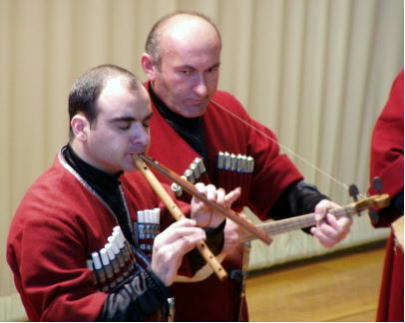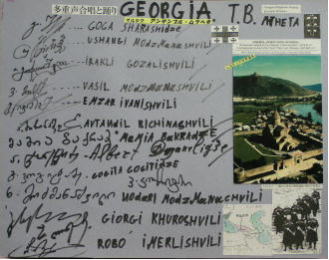No.205-4
Surprise concert: A wave of sentiment fills the hall
 |
|
Date: February 21, 2004 (Sat.) 12:00 p.m.
Venue:
Gymnasium, Gohongi Elementary School |
gEnsemble Mtskhetah
-Georgian Polyphonic Choral Music and Dancing -
gA Masterpiece of the Oral and Intangible Heritage of
Humanityh proclaimed
by UNESCO
It sounded like a chorus of angels
coming down from the Garden of Eden. Yes, Georgia is said to be greatly
influenced by the ancient story of Eden. Mt. Ararat, known as the place Noahfs
ark landed after escaping the great flood, is located in neighbouring Turkey
and to the south of Georgia. Northwest of Georgiafs current capital, Tbilisi,
is Mtskheta; an ancient capital that prospered from 4th century BC to 6th
century AD. And it is this historical district that UNESCO has designated as a
World Heritage Site.
Ensemble Mtskheta performed for the World
Traditional Performing Arts Festival and kindly spared time to give a goodwill
concert at Gohongi Elementary School, before leaving for their home country
from Narita airport. Polyphonic singing is one of the Masterpieces of the Oral and
Intangible Heritage of Humanity that have been declared by UNESCO.
All vocal parts mutually interwoven; the secret technique of Polyphonic
Singing
Ikuko Suzuki (music producer; Meguro Ward resident)
Georgia
is a country I had never heard of before. So after e-mail about the concert
came from Ms. Hamada, a member of Meguro UNESCO Association, I browsed the Web
for some basic information about the country. I found it is wedged between
Turkey, Russia and the Black Sea. I had been in Salzburg, Austria to study eeducation
on music and movement (dancing)f till last summer. A Turkish classmate had
brought an instrument from his homeland and often played for the other
students. The instrument was a sort of drum, 80 cm in diameter, suspended from
his shoulder and hit by a thin drumstick held in each hand. The performance of
this instrument is always accompanied by dance; men play the instrument and
women dance. He showed us how to dance, which was great fun. The memory of our
dancing together came back while listening to this concert. Polyphony is two or more vocal parts, each with
its own individual melodic importance. So there exists no clear distinction
between which part is the main melody and which part is the accompaniment. This
technique is not restricted to European folk music; it can be found in folk
music all over the world. For instance, Jongarubushi in Japan has the same
feature.
What made the audience feel uplifted? Was it
because of the interwoven sounds of all the vocal parts? It is a mysterious
art.
I appreciated the depth of consciousness the
Ensemble Mtskheta had in terms of music. I wanted an encore and left the
concert with a hunger for more. I found myself looking for a further
opportunity to watch and listen to it again.
My impression of the Ensemble Mtskheta
Shiori Tagawa (a member of Meguro UNESCO Association)
Such
a rich voice and solemn harmony a long tradition produces! It was not long
before I was touched by the attractive sounds of the ensemble. I suppose that
most Japanese rarely hear of Georgia, and even those who do, their knowledge of
the country is very limited. Maybe we know it is near the Black Sea and know of
its special yoghurt, but that is about all. Very few Japanese people can
imagine how this small country, far from Japan, has experienced a complicated
history chiefly because of its location, and yet kept a unique and profound
tradition developed by the mixture of western and eastern cultures. I was one
such person
Polyphony
is not only Georgian; it can be found in many places in the world. However, the
perfectly formed and beautiful sounds of the ensemble made me understand the
countryfs dignity cultivated through its long history, peoplefs love for their
country and the pride of their cultural tradition.
Nowadays, new things are being produced one after another and appreciated
around the wo rld, including of course, Japan. However, I think it would be nice if people
could evaluate other cultures and traditions that have passed through the
generations. The concert was arranged very quickly, but more than hundred
people gathered there. The performance was short, but I and the other concert
goers were absolutely thrilled and deeply impressed by the wonderful encounter
with their culture.
rld, including of course, Japan. However, I think it would be nice if people
could evaluate other cultures and traditions that have passed through the
generations. The concert was arranged very quickly, but more than hundred
people gathered there. The performance was short, but I and the other concert
goers were absolutely thrilled and deeply impressed by the wonderful encounter
with their culture.
After the concert
Surprises continued! As the concert was at noon,
we offered the performers lunch at Gohongi elementary school, and after the
lunch they reciprocated by giving another performance. A small number of people
had stayed behind, including the President. The lunchroom echoed with sounds, holy
sounds of anglesf chorus, as if the place were a solemn cathedral. Although it
was just a short impromptu performance, we enjoyed a gorgeous cultural
exchange.
The
wonderful and surprising concert was held due to the support of the following:
Ms. Yuko Togashi (specialist of East European culture including Bulgarian and
Georgian culture) who worked as an interpreter and translator for Georgian
performers at the World Traditional Performing Arts Festival; Japan Folk
Performing Arts Association Inc.; and Ms. Yasuko Hamada (Byzantine artist), who
is a member of Meguro UNESCO Association and a friend of Ms. Togashi.
We
only had 10 days from the confirmation of the concert to the day of the actual
performance. Mr. Furukawa, the principal of Gohongi elementary school, kindly
let us use their gymnasium. We quickly prepared and distributed many pamphlets
advertising the concert, and put a notice on our homepage, but we feel very
sorry that the announcement was not more widespread. All are welcome to the
secretariat to watch the video recording the beautiful performance and sounds
of the day.
next page
